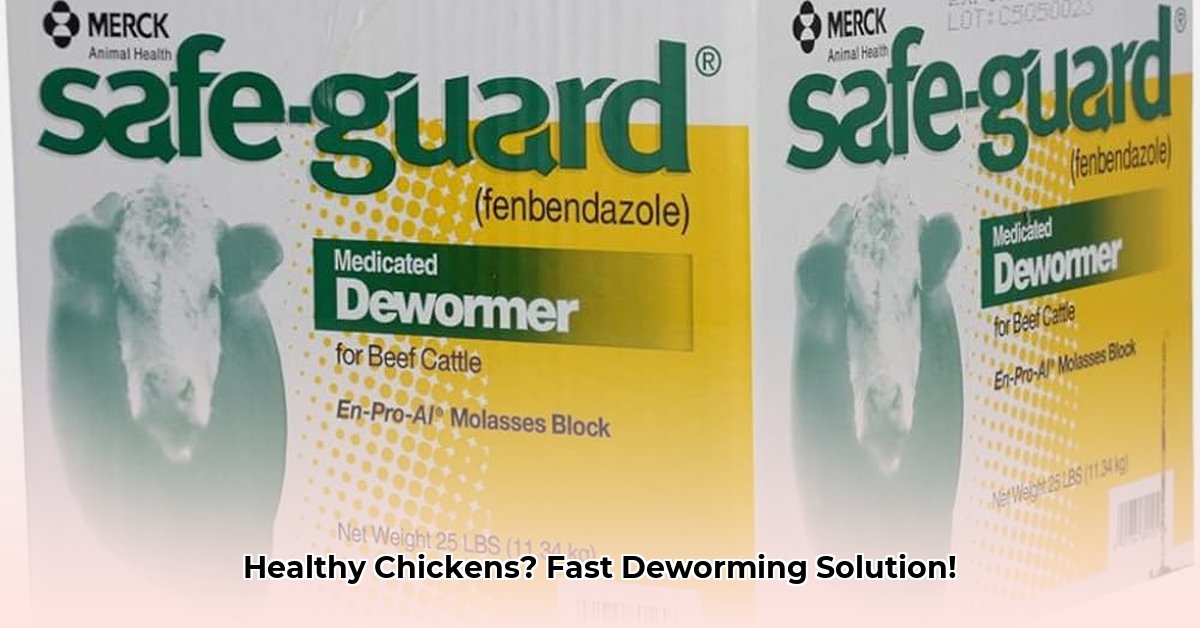
Worried about intestinal worms in your flock? Maintaining healthy chickens requires addressing parasite infestations effectively and safely. For additional information on keeping your chickens warm, check out this helpful resource on chicken coop heaters. Safe-Guard Aquasol, readily available at Tractor Supply, offers a convenient solution for managing common chicken worms. This guide provides step-by-step instructions for its use, alongside a review of its benefits and drawbacks, empowering you to keep your chickens healthy and thriving.
Understanding Safe-Guard Aquasol: A Chicken Dewormer
Safe-Guard Aquasol contains fenbendazole, a broad-spectrum anthelmintic (anti-worm medication) effective against several common poultry parasites, including Ascaridia galli (large roundworms) and Heterakis gallinarum (cecal worms). It’s FDA-approved for use in chickens, assuring you of its safety and efficacy when used as directed.
This medication works by interfering with the parasites' ability to absorb nutrients, effectively starving them and causing their eventual death and expulsion in the droppings. However, remember that Safe-Guard Aquasol's effectiveness may vary depending on the specific parasite species.
Why Choose Safe-Guard Aquasol? Convenience and Ease of Use
Safe-Guard Aquasol stands out due to its ease of administration. Unlike individual dosing, you mix it directly into your chickens' drinking water, streamlining the process, especially for larger flocks. Another crucial advantage is the absence of any egg or meat withdrawal period, allowing for uninterrupted egg sales or meat consumption without concerns about medication residue. This convenience makes it a practical choice for many backyard poultry keepers.
Administering Safe-Guard Aquasol: A Step-by-Step Guide
Accurate dosage is paramount for effectiveness and safety. Here's a precise step-by-step guide:
Step 1: Accurate Weighing: Weigh each chicken individually for the most accurate dosage. Estimate if individual weighing isn't possible using breed and age-specific weight charts readily available online. Even a close estimate is preferable to guessing.
Step 2: Dosage Calculation: Consult the Safe-Guard Aquasol label for the recommended dosage (usually in milliliters per pound or kilogram of body weight). Accurate measurement is crucial for optimal outcomes.
Step 3: Water Preparation: Thoroughly mix the calculated amount of Safe-Guard Aquasol into clean drinking water in a container your chickens can easily access. Ensure even dispersion is achieved.
Step 4: Daily Fresh Water: Provide fresh medicated water daily for five consecutive days. Remove any other water sources to ensure consistent treatment.
Step 5: Monitoring: Carefully monitor your chickens for any unusual behavior or changes in droppings throughout and after the treatment period. Early detection of any issues is critical.
Step 6: Treatment Completion: Complete the full five-day treatment. Stopping early reduces efficacy and increases the risk of parasite re-infestation. Consistency promotes success.
Addressing Potential Risks: Safe and Responsible Use
While generally safe and effective, potential risks should be addressed:
- Incorrect Dosage: Incorrect dosage can lead to treatment failure or, rarely, adverse effects.
- Parasite Resistance: Overuse of any single dewormer can lead to resistance.
- Accidental Exposure: Always wear gloves when handling Safe-Guard Aquasol to prevent skin contact.
Mitigation Strategies:
- Follow instructions meticulously.
- Consider deworming rotation: Discuss a rotation strategy with your veterinarian to help prevent resistance, especially if faced with persistent parasite problems.
- Maintain meticulous hygiene: A clean coop significantly reduces parasite transmission.
Safe-Guard Aquasol: Pros and Cons – A Balanced Perspective
To make an informed choice, consider both advantages and limitations:
| Pros | Cons |
|---|---|
| FDA-approved; proven safety and efficacy | Potential for parasite resistance with prolonged use |
| Convenient water-soluble formulation | Requires accurate weight and dosage calculations |
| No withdrawal period for eggs or meat | May not be effective against all types of intestinal parasites |
| Widely available at Tractor Supply | Requires monitoring and prompt intervention if problems arise |
Beyond Safe-Guard Aquasol: A Holistic Approach to Chicken Health
Effective deworming is just one aspect of comprehensive poultry health management. Integrate these strategies for optimal results:
- Rigorous Coop Hygiene: Regular cleaning and disinfection of your coop.
- High-Quality Feed and Water: Provide fresh, clean water and nutritious feed consistently.
- Regular Monitoring: Observe your chickens closely for any signs of illness or unusual behavior.
- Veterinary Consultation: Your veterinarian is your best resource for comprehensive parasite control advice and flock health management. Don't hesitate to consult them with any concerns.
By combining effective deworming with proactive husbandry practices, you can create a thriving and healthy flock. Remember, prevention remains the most effective tool in your arsenal. A healthy, parasite-free flock contributes to happier chickens and more successful poultry keeping!